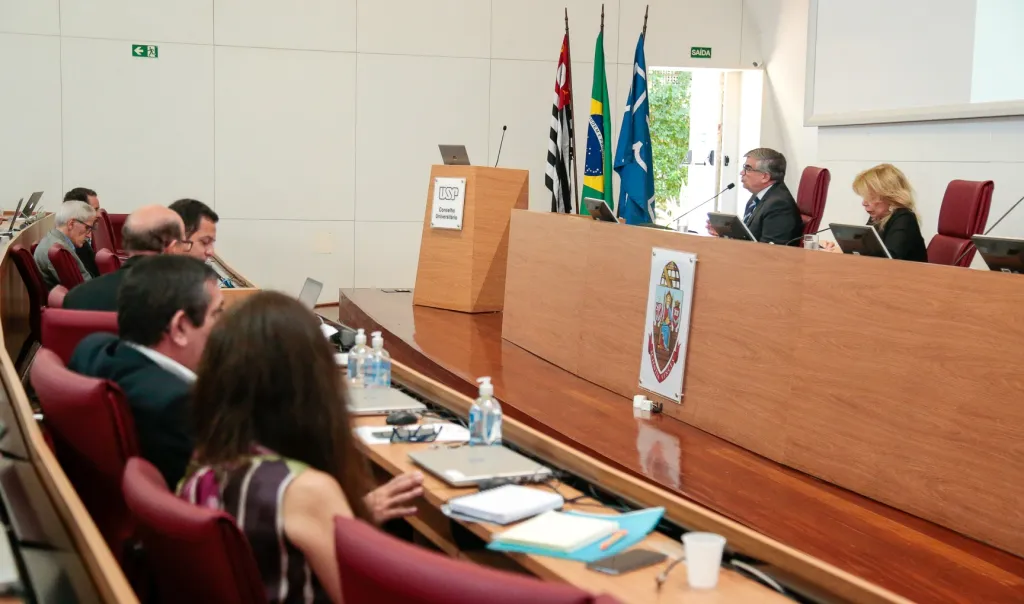USP announces four new study centers on agriculture, oncology, and the Amazon Rainforest
The announcement was made during a meeting to carry out the financial balance of the first year of the mandate of the current’s administration. During the event, the presidency also commented on its perspectives and course of action for the current year. Learn more about USP’s new centers of studies here.

Photo: Cecilia Bastos/USP Imagens
On January 26th 2023, USP’s President, Professor Carlos Gilberto Carlotti Junior, unveiled a project for four new study centers at the University: Sustainability of the Amazon Rainforest, Technology for Precision Oncology, Carbon Studies in Tropical Agriculture, and Sustainable Agriculture.
The announcement was made during a meeting with the directors of the Central Administration of the University, which took place at the University Council Room, to present the financial balance of the administration’s first year of mandate.
In addition to the announcement of the new centers, the president alongside Vice-President Maria Arminda do Nascimento Arruda, also made public their projects envisioned for 2023.
Four new study centers
One of the major projects starting this year is the creation of four new study centers, which have been announced by the President at the beginning of the meeting.
The centers are: the Center of Studies of Sustainability of the Amazon Rainforest, which will be coordinated Paulo Eduardo Artaxo Netto, professor of the Physics Institute; the Center of Studies and Technology for Precision Oncology, coordinated by Roger Chammas, professor of the Medical School; the Center of Carbon Studies in Tropical Agriculture, coordinated by professor Carlos Eduardo Pellegrino Cerri, of the “Luiz de Queiroz” College of Agriculture; and the Center of Studies in Sustainable Agriculture, also coordinated by a professor of the College of Agriculture, Durval Dourado Neto.
According to the University’s president, the goal is for USP to create around ten interdisciplinary centers until the end of the current administration, in 2026. Professor Carlotti explained that “the proposal is for the centers to be tied to the Presidency, but also to gather researchers from various institutes and develop activities related to research, education and extension”. The President also adds that this kind of initiative is trending in universities internationally.
Representatives of each center gave a brief explanation regarding the line of work of their respective areas.
Plans for 2023
Vice-President Maria Arminda do Nascimento Arruda and representatives of the five Pro-rectories looked back on the accomplishments of 2022 and presented the administration’s plan for the next 12 months.
Professor Arruda reinforced the role of the University as an “agent of transformation and a laboratory of society” and of the Vice-Presidency as a “transversal organ, present in all the actions made by the University, with provisions to develop structuring actions that are able to back up university policies”. The Vice-President recalled some of the initiatives that took place last year, such as the event USP Pensa Brasil, designed to develop strategies for a new country and the contribution of USP to its nation.
Afterwards, each pro-rector showed their established actions on their first year as head of their respective segment. They also discussed their current plans for the following year. The Pro-Rectory of Undergraduate Studies, managed by pro-rector Aluísio Cotrim Segurado, reinforced its focus on projects related to updating and curriculum flexibilization, as well as the development of academic performance indicators for the evaluation of the area.
The pro-rector of Graduate Studies, Marcio de Castro Silva Filho, presented the new graduate openings and the programs to be launched this year.
The Pro-Rectory of Research and Innovation, represented by its pro-rector, Paulo Alberto Nussenzveig, announced the creation of the Research Integrity Office, which will establish a set of ethical rules for researchers and for the University itself, in order to enable these social actors to promote benefits to society.
The pro-rector of Culture and University Extension, Marli Quadros Leite, informed that one of its propositions for this year is the establishment of extension activities as part of the students’ curricula.
With the closing statement, the adjunct pro-rector of Inclusion and Belonging, Miriam Debieux Rosa, shared measures that are being adopted related to the USP Residential Complex (Crusp) and the news regarding the Program of Permanence and Student Formation (PAPFE), and the development of the program USP Diversa, among other themes.
